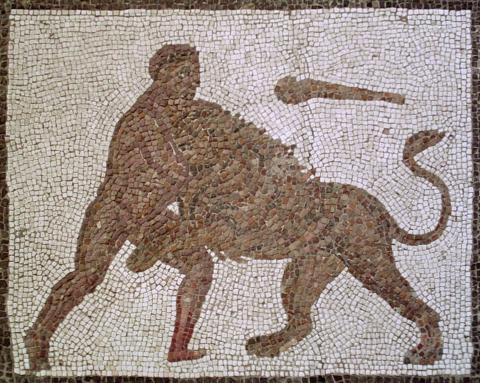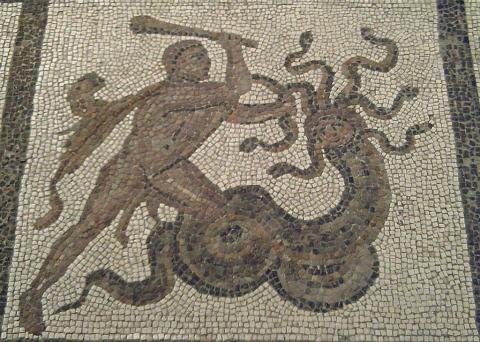Quae bella? quidquid horridum tellūs creat30
inimīca, quidquid pontus aut āēr tulit
terribile dīrum pestilēns ātrōx ferum,
frāctum atque domitum est. superat et crēscit malīs
īrāque nostrā fruitur; in laudēs suās
mea vertit odia; dum nimis saeva imperō,35
patrem probāvī, glōriae fēcī locum.
quā Sōl redūcēns quāque dēpōnēns diem
bīnōs propinquā tinguit Aethiopas face,
indomita virtūs colitur et tōtō deus
nārrātur orbe. mōnstra iam dēsunt mihi40
minorque labor est Herculī iussa exsequī,
quam mihi iubēre; laetus imperia excipit.
quae fera tyrannī iussa violentō queant
nocēre iuvenī? nempe prō tēlīs gerit
quae timuit et quae fūdit: armātus venit45
leōne et hȳdrā.
Notes
Juno complains that Hercules has defeated every monster she has sent against him and that all she has succeeded in doing is making him more famous.
30 quae bella: sc. geram: “what (kind of) warfare (shall I wage)?” quidquid horridum: “whatever horrid thing.” Latin neuter adjectives mean “thing(s)” when used as nouns (AG 289).
32 This remarkable line is composed entirely of neuter adjectives that describe the terrible things that Hercules has removed from the earth.
33 The final syllable of frāctum is elided, and the e of est is prodelided after domitum. Read: frāct’ āt | quĕ dŏmĭt | ūmst ‖. See note 2. malīs: ablative of source (AG 403). superat … crēscit … fruitur: the subject is Hercules.
34 īrāque nostrā: ablative governed by the deponent verb fruitur (AG 410).
35 nimis saeva: “things too savage," i.e. she thought she was giving commands too savage for Hercules to carry out. As at line 30, Latin neuter adjectives mean “thing(s)” when used as nouns. dum imperō: “while (I was) ordering.” Dum is used with the indicative to denote continuous action in past time (AG 556).
36 patrem probāvī: “I (merely) proved (the identity of his) father.” L-S probo III.B, “to make a thing credible.” Juno’s extraordinary efforts to destroy Hercules have only managed to confirm that his father is indeed Jupiter, king of the gods. glōriae fēcī locum: “I have (merely) given him an opportunity for glory.” L-S locus II.C, “room, opportunity, cause, occasion.” gloriae is dative.
37-38 Homer, Odyssey 1.23–24 described the Ethiopians as living “divided… some where the sun sets and some where it rises.” Seneca’s description of the rising and setting sun darkening the skin of the “double” Ethiopians recalls this passage.
37 quā: “where” (adv.) as in line 8.
38 propinquā … face: ablative of instrument (AG 409). Seneca describes the sun as a “torch” (fax) and, like many other ancient writers, imagines it as being nearer to Africa than to other parts of the world. tinguit: an alternative spelling of tingit (both spellings are disyllables, since the gu is pronounced as a single consonant, like qu). Dark-skinned races were thought by Greek and Roman writers to have had their faces burned by closeness to the sun (see Servius’s fourth-century commentary on Vergil’s Aeneid 4.481).
39 indomita virtūs: i.e., Hercules’ courage and strength, his qualities associated with being a vir; not his “virtue” in the modern sense of moral behavior. deus: though Hercules is not yet the god he will become after his death, the world already speaks of him as one.
40 mihi: dative of possession with dēsum (AG 373.b): “monsters are lacking to me,” i.e., “I have run out of monsters.”
41 Herculī: dative: “for Hercules.”
42 quam: connect to 41 minor.
43 tyrannī: the tyrant of Argos, Eurystheus, who assigned the twelve Labors to Hercules. Hercules undertook these labors as the price of returning to Argos from Thebes. His mortal father Amphitryon had been exiled from Argos for killing his father-in-law Electryon there. Eurystheus agreed to let Hercules and his family return on the condition that he perform the labors to “tame the land” by ridding it of menacing beasts (Euripides, Heracles 1–20). All sources agree that Eurytheus was a contemptible person and Hercules’ servitude to him an injustice.
43-44 violentō … iuvenī: the verb nocēre normally governs a dative (AG 367).
43 queant: potential subjunctive (AG 446).
45 quae timuit: as Fitch observes, this phrase does not suggest that Hercules was a coward, but that these monsters would frighten anyone. The hero now wears the Nemean lion’s skin and uses the Hydra’s poison on his arrows to signify his victory. fūdit: “overthrew,” see L-S fundo -ere I.B.2.β “overthrow, overcome, rout, vanquish.” The metaphor is of “pouring out” a defeated enemy onto the ground
46 leōne et hȳdrā: references to two of Hercules’ early labors. He killed a lion that terrorized Nemea near Argos (as on this Roman mosaic from Spain). Another of his labors was to kill the Hydra of Lerna, a many-headed snake whose heads grew back as he cut them off (see another Roman mosaic from Spain). Amphitryon mentions them in his catalog of Hercules’ Labors (222–248).
Vocabulary
horridus –a –um: rough, bristly; savage; rude
terribilis –e: terrifying
dīrus –a –um: ominous, fearful, horrible; dire
pestilens pestilentis: unhealthy, noxious
atrōx atrōcis: terrible, cruel
domō domāre domuī domitus: to tame, subdue
redūcō redūcere redūxī reductus: to bring back; to restore
dēpōnō dēpōnere dēposuī dēpositus: to put down, lay aside
bīnī –ae –a: two by two; two (> bis)
propinquus –a –um: near
tingō tingere tīnxī tīnctus: to wet, moisten; dye, color
Aethiops Aethiopis m.: an Ethiopian
indomitus –a –um: untamed, wild
mōnstrum –ī n.: monster; omen
Herculēs Herculis m.: Hercules
exsequor exsequī exsecūtus sum: to follow, accomplish
tyrannus –ī m.: tyrant
violentus –a –um: violent, fierce
queō quīre quīvī or quiī quitus: to be able
iuvenis iuvenis m.: youth, young man
nempe: indeed
armō –āre –āvī –ātus: to equip, arm
leō leōnis m.: lion


